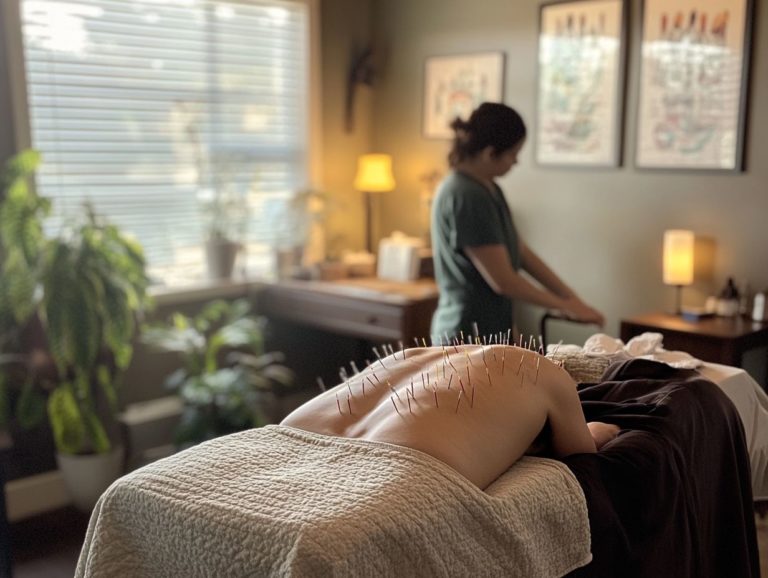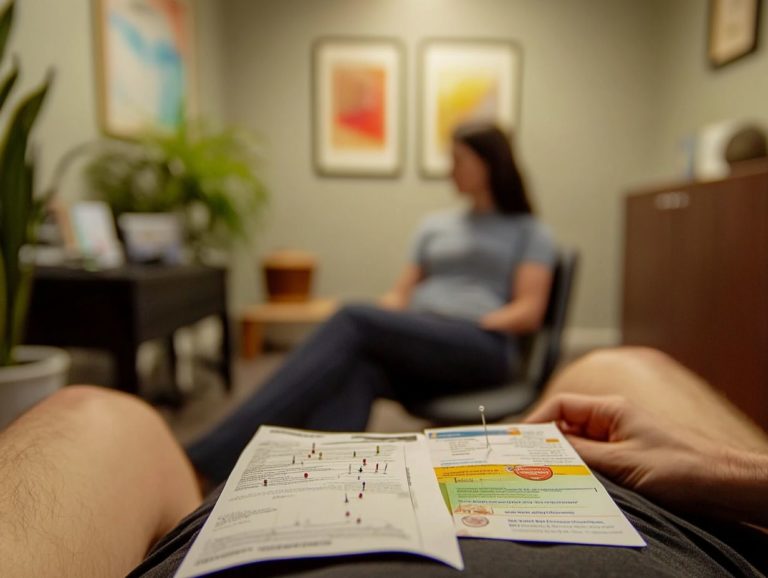Acupuncture’s Role in Cancer Care: What You Need to Know
Discover how acupuncture, a time-tested therapy, can enhance your cancer care journey! Acupuncture is an ancient practice that has found its place in modern healthcare, especially in cancer care.
This article delves into the principles of acupuncture, highlighting its benefits for cancer patients and the scientific evidence backing its effectiveness.
You will find guidance on selecting a qualified acupuncturist, what to expect during a session, and how to seamlessly integrate acupuncture with conventional treatments.
Whether you are a patient in search of relief or simply curious about this holistic approach, you ll uncover valuable insights that will deepen your understanding of acupuncture in the context of cancer care.
Contents
- Key Takeaways:
- Understanding Acupuncture
- How Acupuncture is Used in Cancer Care
- Scientific Evidence for Acupuncture in Cancer Care
- Choosing an Acupuncturist for Cancer Treatment
- What to Expect During an Acupuncture Session
- Integrating Acupuncture with Conventional Cancer Treatment
- Frequently Asked Questions
- What is acupuncture’s role in cancer care?
- How does acupuncture help with cancer care?
- Is acupuncture safe for cancer patients?
- What other benefits does acupuncture offer for cancer patients?
- Can acupuncture cure cancer?
- Are there any risks associated with acupuncture for cancer patients?
- Is Acupuncture Safe for Cancer Patients?
- Benefits of Acupuncture for Cancer Patients
- Can Acupuncture Cure Cancer?
- Risks Associated with Acupuncture
Key Takeaways:

- Acupuncture is a form of traditional Chinese medicine that involves the insertion of thin needles into specific points on the body to promote healing and alleviate symptoms.
- Cancer patients can benefit from acupuncture as a complementary therapy, helping to manage treatment side effects, reduce pain, and improve overall well-being.
- Scientific studies have shown promising results for using acupuncture in cancer care, but further research is needed to fully understand its effectiveness and integration with conventional treatment methods.
Understanding Acupuncture
Acupuncture is an ancient practice steeped in Traditional Chinese Medicine (TCM), where thin needles are expertly inserted into specific points on your body. This method promotes healing by balancing the flow of vital energy, known as qi.
The goal is to restore harmony within your body’s energy pathways, enhancing your overall well-being while addressing various health concerns such as pain relief, nausea, and stress reduction.
As a holistic treatment, acupuncture is gaining recognition for its effectiveness in managing chronic conditions and alleviating symptoms related to cancer and its treatments. It offers a truly integrative approach to healthcare.
Definition and Principles
The essence of acupuncture lies in stimulating specific points along the body’s energy pathways, thereby regulating the flow of qi. This ancient practice emphasizes balance and harmony within your body, addressing both physical and emotional health challenges.
By targeting these precise points, practitioners work to restore equilibrium to your energy pathways, which are believed to play a crucial role in overall well-being. Each pathway corresponds to specific organs and functions, creating a dynamic network that supports your health.
Traditional Chinese medicine asserts that disruptions in the flow of qi can lead to illness, making it essential to realign this energy. Acupuncture transcends mere symptom relief; it aims to uncover and address root causes, fostering a holistic healing process that is deeply revered in its cultural origins.
How Acupuncture is Used in Cancer Care
Acupuncture is becoming an increasingly popular complementary treatment for cancer patients, particularly for managing the side effects of chemotherapy.
Issues like nausea, pain, fatigue, hot flashes, and peripheral neuropathy can significantly impact well-being. By targeting specific acupuncture points, this holistic approach strives to enhance your quality of life, reduce stress, and strengthen your immune system. It serves as a valuable ally alongside conventional oncology treatments.
Benefits for Cancer Patients
Acupuncture offers a wealth of benefits for cancer patients, alleviating symptoms such as pain, nausea, fatigue, and hot flashes. By incorporating this practice, you can significantly enhance your quality of life.
This complementary therapy addresses both physical discomfort and emotional well-being during challenging treatments like chemotherapy. Research shows that around 80% of cancer patients report a reduction in the severity of nausea when they include acupuncture in their care regimen.
Studies also reveal that this ancient practice can lead to marked decreases in anxiety and depression levels, fostering a sense of calm and overall well-being.
Many patients undergoing acupuncture treatments find they rely less on medications for pain management, thus enhancing their overall treatment experience. By promoting relaxation, improving sleep quality, and mitigating the side effects of conventional therapies, acupuncture exemplifies a holistic approach that supports both physical healing and emotional resilience throughout the cancer journey. Don t miss out on the chance for improved well-being!
Scientific Evidence for Acupuncture in Cancer Care
Extensive studies and clinical trials have explored the efficacy of acupuncture in cancer care, uncovering compelling evidence that supports its role in reducing symptoms such as pain and nausea.
Research, including randomized controlled trials (RCTs) approved by the FDA, has shown that acupuncture can significantly enhance the quality of life for cancer patients. It serves as a valuable complement to conventional treatments, offering an alternative approach to symptom management.
Studies and Findings

Multiple studies have amassing evidence that supports the effectiveness of acupuncture in cancer care. These studies consistently demonstrate its ability to alleviate symptoms and enhance patient outcomes.
For example, a randomized controlled trial published in the Journal of Clinical Oncology investigated the impact of acupuncture on chemotherapy-induced nausea and vomiting among breast cancer patients. This study utilized a double-blind design, comparing acupuncture against a placebo treatment.
The results were telling: participants receiving acupuncture reported significantly reduced nausea levels and improved overall quality of life.
Another analysis focused on acupuncture’s role in managing pain and fatigue for patients undergoing radiation therapy. Regular acupuncture sessions led to a noticeable decrease in reported pain levels.
These studies highlight the potential of acupuncture as a valuable adjunct therapy, enriching the landscape of holistic patient care.
Choosing an Acupuncturist for Cancer Treatment
Finding the right acupuncturist is crucial for your cancer treatment. Act promptly to ensure you receive the best care possible.
Choosing a qualified acupuncturist is essential for cancer patients who wish to integrate acupuncture into their treatment plan. Assessing the practitioner’s credentials and qualifications can profoundly influence the effectiveness of the therapy.
It s vital to evaluate their experience in cancer care and their knowledge of specific acupuncture techniques that target symptoms associated with chemotherapy and other cancer treatments. Making an informed choice can enhance your therapeutic experience and support your wellness journey.
Qualifications and Credentials to Consider
- Look for practitioners with specialized knowledge and experience in treating cancer patients.
- Seek acupuncturists who hold relevant certifications from recognized organizations, such as the National Certification Commission for Acupuncture and Oriental Medicine (NCCAOM).
- Experience is equally important; they should ideally have roles in cancer treatment settings that demonstrate their ability to navigate the unique challenges faced by patients.
Engaging in a detailed discussion about their specific training in oncological acupuncture can provide a solid foundation for evaluating their expertise. This ensures you receive comprehensive and personalized treatment.
What to Expect During an Acupuncture Session
Picture yourself in a calm and peaceful setting. During your session, skilled practitioners will gently place needles to help you relax and heal.
This procedure is generally painless and soothing, designed to enhance your mental well-being by alleviating anxiety and stress. While most experiences are overwhelmingly positive, some individuals might encounter mild side effects, such as bruising or fatigue, after treatment.
Procedure and Potential Side Effects
The acupuncture procedure involves the precise insertion of fine needles into specific points on your body, stimulating healing and enhancing pain relief. Most patients feel relaxed during the process. While generally safe, you might experience some minor side effects, such as slight bruising, fatigue, or temporary discomfort at the needle sites.
To ensure you have a positive experience, practitioners conduct a comprehensive assessment of your medical history and current health concerns. The needles, typically as thin as a hair, are gently inserted to specific depths with controlled pressure. Various techniques may be employed, including the rotation of the needles or mild electrical stimulation, to amplify the effects.
Comfort measures play a vital role. You ll be encouraged to relax, and practitioners might use warm towels or soothing music to cultivate a calming atmosphere. Some individuals may feel minor side effects like light-headedness or soreness, but these are usually fleeting.
The overall safety and effectiveness of acupuncture position it as a valuable alternative for many seeking pain management solutions.
Integrating Acupuncture with Conventional Cancer Treatment
Integrating acupuncture with conventional cancer treatment offers you a wealth of benefits. It enables you to manage symptoms more effectively while enhancing your overall treatment experience.
In a way of combining different cancer treatments, acupuncture is an effective complementary therapy that enhances traditional treatments. This approach may improve your outcomes and help reduce the side effects commonly associated with chemotherapy.
Benefits and Considerations

Acupuncture can offer amazing benefits for your cancer treatment! You can expect improved symptom management, enhanced pain relief, and a greater sense of well-being.
It s essential to consider various factors, such as your unique treatment plan and preferences. Collaborating with your healthcare team is crucial for achieving optimal outcomes.
When discussing acupuncture s role, recognize its capacity to alleviate side effects from conventional treatments like chemotherapy. This ancient technique has the potential to reduce nausea, anxiety, and fatigue, providing a complementary approach to your conventional care.
It s important to work closely with your oncologist to develop an individualized treatment plan that respects your medical history and ongoing treatments.
Every patient s journey is distinct. Thoughtful integration of acupuncture can help ensure both safety and efficacy, promoting a holistic healing experience tailored specifically to your needs.
Frequently Asked Questions
What is acupuncture’s role in cancer care?
Acupuncture is a complementary therapy that can be used alongside traditional cancer treatments to help manage symptoms and improve overall well-being.
How does acupuncture help with cancer care?
Acupuncture involves the insertion of thin needles into specific points on the body to stimulate the body’s natural healing response. This can help alleviate symptoms such as pain, nausea, and fatigue while improving emotional and mental well-being.
Is acupuncture safe for cancer patients?
Yes, acupuncture is generally considered safe for cancer patients. However, it is important to consult with a trained and licensed acupuncturist who has experience working with cancer patients.
What other benefits does acupuncture offer for cancer patients?
In addition to managing symptoms, acupuncture has been shown to improve sleep, reduce stress and anxiety, and increase energy and overall quality of life for cancer patients.
Can acupuncture cure cancer?
No, acupuncture does not cure cancer. It is meant to be used as a complementary therapy to traditional cancer treatments and can help manage symptoms and improve well-being, but it is not a substitute for medical treatment.
Are there any risks associated with acupuncture for cancer patients?
While generally safe, patients should always discuss potential risks with their healthcare provider before starting treatment.
Is Acupuncture Safe for Cancer Patients?
Yes, acupuncture is generally safe for cancer patients when performed by a trained and licensed acupuncturist. Always check that they follow proper hygiene practices to avoid any risk of infection.
Benefits of Acupuncture for Cancer Patients
Acupuncture can help manage symptoms and improve sleep. It also reduces stress and anxiety, boosting energy and overall quality of life.
Can Acupuncture Cure Cancer?
No, acupuncture does not cure cancer. It serves as a complementary therapy alongside traditional treatments, helping with symptoms and enhancing well-being.
Risks Associated with Acupuncture
While generally low-risk, ensure your acupuncturist uses sterile needles to minimize the chance of infection.







